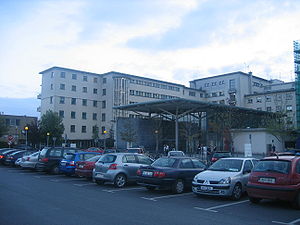
Health care in the Republic of Ireland
Encyclopedia

The public health care system
Health care system
A health care system is the organization of people, institutions, and resources to deliver health care services to meet the health needs of target populations....
of Ireland
Ireland
Ireland is an island to the northwest of continental Europe. It is the third-largest island in Europe and the twentieth-largest island on Earth...
is governed by the Health Act 2004, which established a new body to be responsible for providing health and personal social services to everyone living in Ireland - the Health Service Executive
Health Service Executive
The Health Service Executive is responsible for the provision of healthcare providing health and personal social services for everyone living in Ireland, with public funds. The Executive was established by the Health Act, 2004 and came into official operation on January 1, 2005...
. The new national health service came into being officially on 1 January 2005; however the new structures are currently in the process of being established as the reform programme continues. In addition to the public-sector, there is also a large private healthcare market.
In 2005, Ireland spent 8.2% of GDP
Gross domestic product
Gross domestic product refers to the market value of all final goods and services produced within a country in a given period. GDP per capita is often considered an indicator of a country's standard of living....
on health care, or US$3,996 per capita. Of that, approximately 79% was government expenditure.
Health care system
All persons resident in Ireland are entitled to receive health care through the public health care system, which is managed by the Health Service ExecutiveHealth Service Executive
The Health Service Executive is responsible for the provision of healthcare providing health and personal social services for everyone living in Ireland, with public funds. The Executive was established by the Health Act, 2004 and came into official operation on January 1, 2005...
and funded by general taxation. A person may be required to pay a subsidised fee for certain health care received; this depends on income, age, illness or disability. All maternity services and child care up to the age of six months are provided free of charge. Emergency care is provided at a cost of €120 for a visit to the Accident and Emergency department.
Everyone living in the country, and visitors to Ireland who hold a European Health Insurance Card
European Health Insurance Card
The European Health Insurance Card is issued free of charge and allows anyone who is insured by or covered by a statutory social security scheme of the EEA countries and Switzerland to receive medical treatment in another member state for free or at a reduced cost, if that treatment becomes...
, are entitled to free maintenance and treatment in public beds in Health Service Executive and voluntary hospitals. Outpatient services are also provided for free. However the majority of patients on median incomes or above, are required to pay subsidised hospital charges.
The Medical Card - which entitles holders to free hospital care, GP visits, dental services, optical services, aural services, prescription drugs and medical appliances- is available to those receiving welfare payments, low earners, those with certain long-term or severe illnesses and in certain other cases. Many political parties support extending the availability of the Medical Card to eventually cover everyone resident in Ireland - they currently cover 31.9% of the population. Those on slightly higher incomes are eligible for a GP Visit Card which entitles the holder to free general practitioner visits. For persons over 70 years who are not entitled to a medical card or GP visit card they instead receive an annual cash grant of €400 up to a certain income.
People who are not entitled to a Medical Card (i.e. 68.1% of the population) must pay fees for certain health care services. There is a €100 A&E charge for those who attend an accident and emergency department without a referral letter from a family doctor (a visit to which usually costs €50-75). Hospital charges (for inpatients) are a flat fee of €100 per day up to a maximum of €1000 in any twelve month period, irrespective of the actual care received. Specialist assessments and diagnostic assessments (such as X-ray
X-ray
X-radiation is a form of electromagnetic radiation. X-rays have a wavelength in the range of 0.01 to 10 nanometers, corresponding to frequencies in the range 30 petahertz to 30 exahertz and energies in the range 120 eV to 120 keV. They are shorter in wavelength than UV rays and longer than gamma...
s, laboratory tests, physiotherapy, etc.) are provided for free. If a person cannot afford to pay hospital charges, the HSE will provide the services free of charge.
Hospitals

Blanchardstown
Blanchardstown is a large suburb of Dublin in the district of Fingal, Ireland. It is within the historical barony of Castleknock. It is located 10 km north-west of the city centre. The suburb is in the Dublin 15 postal area, the Dublin West electoral constituency, and Fingal County...
, are operated directly by the HSE. There are also hospitals run under a voluntary basis by organisations. Some are teaching hospitals (such as University College Hospital Galway
University College Hospital Galway
University College Hospital Galway or UCHG is the main acute hospital in Galway in the Republic of Ireland...
) operated in conjunction with a university. There are also many private hospitals.
Hospitals in Ireland generally offer a full range of healthcare including accident and emergency services.
Waiting lists
The public health system, despite massive expenditure in recent years, has some problems. An ongoing issue is the "waiting lists" for those requiring, in some cases, serious operations.In 2007, 76% of inpatients were admitted to hospital for operations immediately, 11% had to wait up to one month, 4% had to wait up to three months, 1% had to wait up to six months and 4% had to wait for over six months for operations.
For outpatients, 23% were seen on time, 44% were seen within 30 minutes, 18% waited more than an hour and 7% waited two hours.
The National Treatment Purchase Fund was set up in 2002 for those waiting over three months for an operation or procedure, and as a result over 135,000 patients on waiting lists have been treated so far. The NTPF involves the government paying for public patients to be treated for free in a private hospital in Ireland, or sometimes abroad if necessary. The NTPF has reduced waiting times for procedures to an average of between two to five months (with the average in 2009 being 2.4 months), compared to between two and five years in 2002.
Health centres

Primary care
Primary care is the term for the health services by providers who act as the principal point of consultation for patients within a health care system...
and community services in towns and villages throughout Ireland, and are run by the HSE. Services available at these clinics include GP services, public health nurses, social work and child protection services, child health services, community welfare, disability services, older people services, chiropody, ophthalmic
Ophthalmology
Ophthalmology is the branch of medicine that deals with the anatomy, physiology and diseases of the eye. An ophthalmologist is a specialist in medical and surgical eye problems...
, speech therapy, addiction
Substance dependence
The section about substance dependence in the Diagnostic and Statistical Manual of Mental Disorders does not use the word addiction at all. It explains:...
counselling and treatment, physiotherapy, occupational therapy
Occupational therapy
Occupational therapy is a discipline that aims to promote health by enabling people to perform meaningful and purposeful activities. Occupational therapists work with individuals who suffer from a mentally, physically, developmentally, and/or emotionally disabling condition by utilizing treatments...
, psychiatric services, Home Help and more. These services are available for free or at a subsidised rate.
General practitioners
Primary healthcare in Ireland is mostly provided by general practitionerGeneral practitioner
A general practitioner is a medical practitioner who treats acute and chronic illnesses and provides preventive care and health education for all ages and both sexes. They have particular skills in treating people with multiple health issues and comorbidities...
s (GPs), who generally operate as sole traders or in health centres with other GPs and sometimes nurses. Most GPs also offer house visits to their patients, with there being emergency "out-of-hours" GP services available in all parts of the country. GPs generally charge on a per consultation fee basis, usually charging anything up to €60. People with Medical Cards or GP Visit Cards are exempt from charges. Many GPs also provide services to those with Hepatitis C
Hepatitis C
Hepatitis C is an infectious disease primarily affecting the liver, caused by the hepatitis C virus . The infection is often asymptomatic, but chronic infection can lead to scarring of the liver and ultimately to cirrhosis, which is generally apparent after many years...
and maternity and infant services for free. Those with private health insurance can, depending on their plan, get their GP costs paid for or refunded ("cash back"), either fully or partially by the insurance company. People can also claim tax relief for GP visit costs.
Waiting times

Drugs
Prescription drugs and medical appliances are available to all for free or at a reduced cost. The Drugs Payment Scheme ensures that every household only has to pay, maximum, €120 per calendar month for up to a maximum of one month's supply of prescribed drugs, medicines and medical appliances. Those who hold Medical Cards, suffering from long-term illnesses, or who have Hepatitis C, do not have to pay anything for medicines or appliances.All immunisation vaccines for children are provided free of charge, and are provided in schools, health clinics or hospitals.
Recovering heroin addicts are able to get methadone
Methadone
Methadone is a synthetic opioid, used medically as an analgesic and a maintenance anti-addictive for use in patients with opioid dependency. It was developed in Germany in 1937...
treatment for free under the Methadone Treatment Scheme.
Other services
The HSE provide dental, optical (vision) and aural (hearing) health care. Medical Card holders and their dependants, Health Amendment Act Card holders and children get these services for free. Other people can get these services for free or at a reduced cost from the Treatment Benefit Scheme and/or private insurance, or claim tax relief after paying the full cost with a private practitioner.The HSE also provide mental health
Mental health
Mental health describes either a level of cognitive or emotional well-being or an absence of a mental disorder. From perspectives of the discipline of positive psychology or holism mental health may include an individual's ability to enjoy life and procure a balance between life activities and...
services, and treatment and rehabilitation
Drug rehabilitation
Drug rehabilitation is a term for the processes of medical or psychotherapeutic treatment, for dependency on psychoactive substances such as alcohol, prescription drugs, and so-called street drugs such as cocaine, heroin or amphetamines...
services for alcohol and drug addicts.
Payment schemes
Those without a Medical Card or private health insurance are able to receive medical services for free or at a subsidised rate from the Treatment Benefit Scheme - as are their dependants - which brings into account the compulsory Social Insurance Fund (PRSI) contributions they have made. People can also claim tax-relief on medical expenses that are not covered by the State or by private health insurance. Those with private health insurance also get tax credits, which are passed directly on to the insurance company and lower the customer's premium.Visitors to Ireland who hold a European Health Insurance Card
European Health Insurance Card
The European Health Insurance Card is issued free of charge and allows anyone who is insured by or covered by a statutory social security scheme of the EEA countries and Switzerland to receive medical treatment in another member state for free or at a reduced cost, if that treatment becomes...
do not have to pay anything for emergency treatment from a general practitioner or specialist, emergency dental, oral or aural treatment, inpatient or outpatient hospital treatment or prescription medicines. Those who need dialysis
Dialysis
In medicine, dialysis is a process for removing waste and excess water from the blood, and is primarily used to provide an artificial replacement for lost kidney function in people with renal failure...
, oxygen therapy
Oxygen therapy
Oxygen therapy is the administration of oxygen as a medical intervention, which can be for a variety of purposes in both chronic and acute patient care...
or other such treatments, can arrange for it before their visit.
Satisfaction with the health service
A survey, commissioned by the HSE in 2007, found that patient satisfaction with the health service was quite high, with 90% of inpatients and 85% of outpatients saying they were satisfied with their treatment. In addition to this, 97% said they were satisfied with the care provided by their GP.The 2008 Health Consumer Powerhouse Euro Health Consumer Index report ranked Ireland's public healthcare system 11th out of 31 European countries. This is an improvement on the 2007 report which ranked the Ireland 16th out of 29 countries, and a drastic improvement on the 2006 report, in which Ireland was ranked 26th out of 26 countries.
In 2008, the country was ranked ninth in Europe for the standard of its diabetes care.
Health Service Executive
The Health Service Executive (HSE) manages the delivery of the entire health service as a single national entity.There are four HSE administrative areas (HSE Dublin Mid-Leinster, HSE Dublin North-East, HSE South and HSE West), which are in turn divided into 32 Local Health Offices (LHOs).
The HSE is Ireland's largest employer with over 100,000 workers; and has an annual budget of €16 billion, more than any other public sector organisation.
The HSE's organisational structure is divided into three main areas:
- Health and Personal Social Services, which in turn is divided into three service delivery units:
- The National Hospitals Office (NHO), which manages acute hospitalHospitalA hospital is a health care institution providing patient treatment by specialized staff and equipment. Hospitals often, but not always, provide for inpatient care or longer-term patient stays....
and ambulanceHSE National Ambulance ServiceThe HSE National Ambulance Service is the statutory public ambulance service in the Republic of Ireland. The service is operated by the National Hospitals Office of the Health Service Executive, the Irish national healthcare authority.- History :...
services. - Primary, Community and Continuing Care (PCCC), which delivers health and personal social services in the community and other settings.
- Population Health, which promotes and protects the health of the entire population.
- The National Hospitals Office (NHO), which manages acute hospital
- Support Services, which enables the HSE to function efficiently and cost effectively.
- Reform and Innovation, which drives the HSE's strategic and corporate planning processes.
Minister for Health and Children
The Minister for Health and Children has responsibility for setting overall policy with regard to the health service.Private health insurance
Private health insurance is available to the population for those who want to avail of it. Vhi HealthcareVhi Healthcare
The Voluntary Health Insurance Board — which trades under the brand name Vhi Healthcare, and is still commonly referred to in Ireland as "The VHI" - is the largest health insurance company in the Republic of Ireland. It is a statutory corporation whose members are appointed by the Minister for...
(which is owned by the government), Quinn Healthcare, and Aviva provide health insurance, among other services. In 2005, 47.6% of people were covered by private health insurance.
The regulatory body for private health insurance is the Health Insurance Authority
Health Insurance Authority
The Health Insurance Authority is the regulatory body for private health insurance in Ireland. The Authority's remit is to monitor and research health insurance generally; operate the risk equalisation scheme; advise the Minister on health insurance generally; monitor the operation of other...
.
The Hospital Saturday Fund (HSF) is also available to give customers cash towards a range of every day health care costs.
Health statistics
In 2005:- 47.6% of Ireland's population were covered by private health insurance, and 31.9% of the population were covered by Medical Cards.
- 23.8% of the population over 16 had a "chronic illness or health problem".
- 19.6% of the population over 16 had "limited activity", of which 6.6% were "strongly limited" and 13.0% were "limited".
- 47.2% of the population over 16 described their health as "very good", 35.7% as "good", 13.5% as "fair" and only 3.6% as "bad" or "very bad".
- 24.9% of the population over 16 were classed as smokers.
- There were 53 publicly-funded acute hospitals, with a total of 12,094 in-patient beds available and 1,253 day beds available.
- The average length of an in-patient stay in hospital was 6.6 days.
See also
- Health care systemHealth care systemA health care system is the organization of people, institutions, and resources to deliver health care services to meet the health needs of target populations....
- Maev-Ann WrenMaev-Ann WrenMaev-Ann Wren is an Irish economist, journalist, author and former economics editor of the Irish Times newspaper. She has written two books about the Irish health system and her writings have often been mentioned during Dáil and Seanad debates, and in parliamentary committee...
, analyst and critic of Irish healthcare provision

